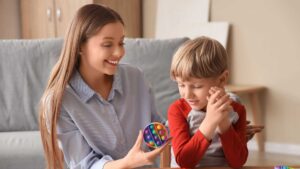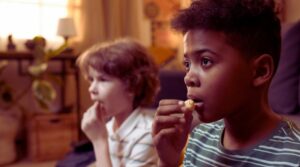ABA Centers of Florida wants to be your resource for all news and information regarding autism, so we wanted to take the opportunity of this blog to showcase Netflix’s hit dating show, Love on the Spectrum. This show is a sympathetic and realistic portrayal of the challenges, charms and kindness of people on the spectrum. The premise revolves around a diverse cast exploring romance and interpersonal relationships through the lens of autism spectrum disorder (ASD).
Aside from their diagnoses, the show’s participants come together in their desire for companionship. Many people think that since the neurodivergent have trouble socializing, they do not feel the same longing for human connection. This notion is false, and Love on the Spectrum’s biggest strength is highlighting the thousands of misconceptions around autism by doing nothing more than allowing its cast to be themselves.
Love on the Spectrum’s stars get to speak on their terms, and a profoundly sympathetic and accurate picture emerges. One walks away with the understanding that people on the spectrum are not different and incomprehensible but another part of the unfolding human experience that yearns for love and acceptance.
1. Love on the Spectrum’s Realistic Portrayal of Autism
An enduring stereotype in portrayals of autism in media is that of the extreme savant. Popularized by Dustin Hoffman’s performance in 1988’s Rain Man, this person mightily struggles with every social interaction and stimuli but exhibits outstanding abilities and interests in niche areas. As the title implies, Love on the Spectrum’s participants occupy a broad spectrum.
ASD encompasses a range of symptoms and behavior. Those on the spectrum may exhibit many or few of the associated behaviors. It’s inherently alienating to believe there is a one-size-fits-all principle to categorize all conduct of those diagnosed with autism.
Take Kaelynn, for example. She is a 24-year-old woman who lives with her roommate. She is very talkative, makes eye contact and expresses a wide range of emotions, and her most prevalent hang-up is that she doesn’t like pictures of dead animals on dating apps. In every meaning of the word, she is independent and capable of moving through the world at an extremely high level, so much so that she engages in speed dating, a profoundly social experience.
There is also Steve, a 62-year-old man who didn’t receive a diagnosis until his 60s. He is charming and goofy, with a cadence and delivery that would be perfect for narrating nature documentaries. Although he has a caretaker who helps him cook, he has lived by himself for most of his life, merely being considered “offbeat” by those he meets.
On the other end of the range, you have Subodh, a 32-year-old accountant who lives with his family. Though he displays difficulty adapting to social cues, he has astounding mathematical abilities. Subodh can do complex multiplication problems in his head and pinpoint what day of the week it was a decade ago within seconds.
It’s important to recognize there is immense variety in neurodivergent people. Realizing this is crucial as the first step toward inclusivity is understanding. Like any other person, those on the spectrum have strengths, weaknesses, preferred topics of conversation, and behaviors that make them comfortable. Dispelling the stereotype of the secluded and stunted neurodivergent person is vital for moving toward a society of acceptance based on reality and not on mistaken assumptions about otherworldly differences.
2. Love on the Spectrum and Passion
Another highly illuminating aspect of Love on The Spectrum is that it does not shy away from showing passion. Despite their difficulty expressing it, people diagnosed with autism have a deep well of emotion they can’t find the words to explain.
Abbey, one of Love on the Spectrum’s younger stars, expressed feeling as if she was Ariel in The Little Mermaid after Ursula steals her voice, wanting to burst out in song but unable to do so. The fullness, intensity, and folly of human emotion are fully displayed.
Dani Bowman, another of the show’s participants, made her passions apparent on dates with Solomon, a young man she liked. Ultimately, they took things too fast, and she realized they might not be compatible, which is an experience that just about everyone who tries their hand at dating has either heard about or experienced.
The palpable excitement of James, a 34-year-old who overcame autism-related anxiety, was visible after going on a fantastic date to the Medieval fair. His hands were visibly unsteady. His voice was audibly shaking. It was a touching moment, relatable to anyone overcome with the uncertainty of going in for a kiss or a hug at the end of a date.
Another topic that Love on the Spectrum explores is the penchant for specialized interests exhibited by those diagnosed with autism. People on the spectrum express strong preferences toward their hobbies and become deeply knowledgeable. Dani Bowman’s talent is for animation and running her business. She teaches animation classes for neurodivergent youth, and her drive to succeed in this area is inspirational.
When given the tools and the necessary support to succeed, it’s astounding what those on the spectrum accomplish.
3. Love on the Spectrum and Healthy Social Behaviors
One of the most exciting aspects of Love on The Spectrum is behavioral therapy. The show employs Jodi Rodgers, a dating coach who walks the participants through social expectations and acquaints them with healthy coping mechanisms for dating and the world.
While preparing Subodh for his upcoming date, she teaches him to thank servers when bringing the menu. One recurring thing she imbues in all participants is conversational skills, advising that it’s essential to listen and ask questions when engaging another, even if the subject isn’t of personal interest.
There is no shame or harshness associated with behavioral coaching. The participants and their families agreed to full participation and approval. Everyone on Love on The Spectrum wishes to find love and understands that they must adapt to their partners.
The principles of this type of coaching are reminiscent of Applied Behavioral Analysis (ABA) therapy, the gold standard for autism therapy. ABA is based on positive reinforcement, rewarding healthy behavior while teaching how to manage stressors and triggers. The idea behind it is that those on the spectrum will have better outcomes if equipped with the skills to handle the hustle of life. Much like Jodi Rodgers’ targeted advice, ABA Therapy is as unique as the challenges faced by someone on the spectrum.
Eye contact, conversational back and forth, how to handle money and when to pay a bill and respect for the boundaries of others are all things that seem second nature to us but do not come naturally to the neurodivergent. They are the skills ABA therapy teaches. The participants of Love on The Spectrum welcomed instruction before their dates and benefitted from it, but some had trouble since social behaviors are something they are still learning.
Love on the Spectrum provides many examples of why ABA Therapy works best when starting young. The concept of early intervention means that when it comes time for someone on the spectrum to engage with the world in an adult fashion, they’ll have a lot of practice and be well-acquainted with the subtleties of social interaction.
Ultimately, the show pulls back the curtain on what it’s like to be neurodivergent without mystifying or infantilizing its stars. Autism is a condition that affects behavior, and it doesn’t mean they are lesser or incapable of love, compassion, wit, whimsy, and fully embodying the human condition.
ABA Centers of Florida and Autism Therapy
Life comes fast, and it can be challenging for neurodivergent people to adapt to the world and its responsibilities. Your loved one on the spectrum will benefit from ABA Therapy, the only autism therapy backed by decades of scientific research. Through compassionate, individualized attention and play-based sessions, those diagnosed with autism can grow in unexpected ways, learning behaviors that will help them in their careers and interpersonal lives.
Pick up the phone and call (772) 773-1975 or contact us on our website. Our experts are ready to help you take the first step toward a brighter future for your loved one.








